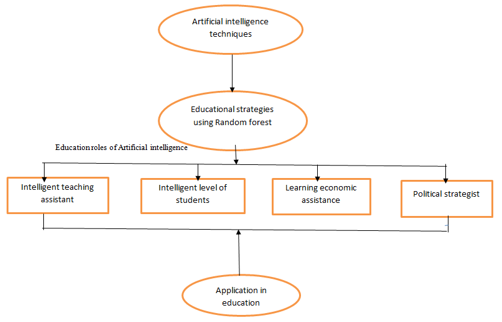Research on the Influence of Artificial Intelligence Technology on the Formulation of Educational Strategies
Keywords:
Artificial intelligence, Educational strategy, learning assistant, Random forest algorithmAbstract
The technological growth influences every field such as agriculture, textile, engineering, automobiles and education. The educational strategies have evolved to a great extent due to artificial intelligence technology. This study focus on the impact of Artificial Intelligence Technology on the Formulation of Educational Strategies. The research proposed a Random Forest Algorithm Educational Strategies based intelligent learning assistant that could improve the formulation of Educational Strategies. The results from the recommended random forest method varied during the learning phase, but it has since shown consistent and improved functionality. Current Support vector machine, fuzzy set based on hesitation, and overall expert score were all outperformed by the proposed method by 7%, 6%, and 17%, respectively, in the final considered evaluation weight range of 30–35.
Downloads
References
B. Smith and H. Shum, “The future computed: Artificial intelligence and its role in society,” Microsoft Corporation, Redmond, 2018.
D. Olley, R. Perrault, and E. Motta, “Artificial intelligence: How knowledge is created, transferred, and used,” Trends in China, Europe, and the United States. Elsevier, New York, 2018.
T. M. Siebel, Digital Transformation: Survive and Thrive in an Era of Mass Extinction. Rosetta Books, New York, 2019.
C. Fadel, W. Holmes, and M. Bialik, “Artificial intelligence in education: promises and implications for teaching and learning” The Center for Curriculum Redesign, Boston, 2019.
W. Holmes, M. Bialik, and C. Fadel, “Artificial intelligence in education: Promises and implications for teaching and learning,” Center for Curriculum Redesign, Boston, MA, 2019.
G. J. Hwang and Y. F. Tu, “Roles and research trends of artificial intelligence in mathematics education: A bibliometric mapping analysis and systematic review,” Mathematics, 2021.
G. J. Hwang, H. Xie, B. W. Wah, and D. Gašević, “Vision, challenges, roles and research issues of artificial intelligence in education, Comput. Educ. Artif. Intell., vol. 1, Article 100001, 2020, 10.1016/j.caeai.2020.100001
T. Käser, S. Klingler, A. G. Schwing, and M. Gross, “Dynamic Bayesian networks for student modelling,” IEEE Trans. Learn. Technol., vol. 10, no. 4, pp. 450–462, 2017.
J. Kay and B. Kummerfeld, “From data to personal user models for life-long, life-wide learners British,” J. Educ. Technol., vol. 50, no. 6, pp. 2871–2884, 2019.
J. Knox, Y. Wang, and M. Gallagher, Eds., “Artificial intelligence and inclusive education: Speculative futures and emerging practices,” Springer Nature Singapore, pp. 1-13, 2019.
N. Garrett, N. Beard, and C. Fiesler, More Than “If Time Allows” The Role of Ethics in AI Education. In Proceedings of the AAAI/ACM Conference on AI, Ethics, and Society, pp. 272–278, 2020.
M. Hernes and J. Sobieska-Karpińska, “Application of the consensus method in a multiagent financial decision support system,” Inf. Syst. e-Bus. Manage., vol. 14, no. 1, pp. 167–185, 2016.
J. Su and W. Yang, “Artificial intelligence in early childhood education: A scoping review,” Comput. Educ. Artif. Intell., p. 100049, 2022, doi: 10.1016/j.caeai.2022.100049.
W. Yang, “Artificial Intelligence education for young children: Why, what, and how in curriculum design and implementation,” Comput. Educ. Artif. Intell. p. 100061, 2022, doi: 10.1016/j.caeai.2022.100061.
T. Wang and E. C. K. Cheng, “An investigation of barriers to Hong Kong K-12 schools incorporating artificial intelligence in education,” Comput. Educ. Artif. Intell., p. 100031, 2021, doi: 10.1016/j.caeai.2021.100031.
X. Xia, “Diversion inference model of learning effectiveness supported by differential evolution strategy,” Comput. Educ. Artif. Intell., p. 100071, 2022, doi: 10.1016/j.caeai.2022.100071.

Downloads
Published
How to Cite
Issue
Section
License
Copyright (c) 2022 Nor Asniza Ishak , Chuan Xing Jiang

This work is licensed under a Creative Commons Attribution-ShareAlike 4.0 International License.
All papers should be submitted electronically. All submitted manuscripts must be original work that is not under submission at another journal or under consideration for publication in another form, such as a monograph or chapter of a book. Authors of submitted papers are obligated not to submit their paper for publication elsewhere until an editorial decision is rendered on their submission. Further, authors of accepted papers are prohibited from publishing the results in other publications that appear before the paper is published in the Journal unless they receive approval for doing so from the Editor-In-Chief.
IJISAE open access articles are licensed under a Creative Commons Attribution-ShareAlike 4.0 International License. This license lets the audience to give appropriate credit, provide a link to the license, and indicate if changes were made and if they remix, transform, or build upon the material, they must distribute contributions under the same license as the original.





